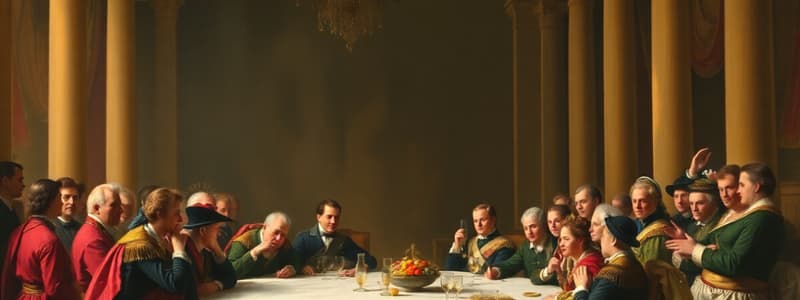Podcast
Questions and Answers
¿Cuál es la característica principal del liberalismo según el contenido?
¿Cuál es la característica principal del liberalismo según el contenido?
- La idea de libertad económica (correct)
- La regulación estatal del mercado
- La promoción del absolutismo
- La limitación de derechos individuales
¿Qué evento de 1820 en Europa fue clave en las revoluciones liberales?
¿Qué evento de 1820 en Europa fue clave en las revoluciones liberales?
- La unificación de Italia
- El Congreso de Viena
- Las revoluciones de 1820 (correct)
- La Revolución Francesa
¿Qué motivación estuvo detrás de las revoluciones de 1848 en Europa?
¿Qué motivación estuvo detrás de las revoluciones de 1848 en Europa?
- Oposición a la guerra
- Deseo de conservar el absolutismo
- Mejorar las condiciones de vida de las clases bajas (correct)
- El fortalecimiento de las monarquías
¿Qué efectos tuvieron las revoluciones del siglo 19 en Europa?
¿Qué efectos tuvieron las revoluciones del siglo 19 en Europa?
¿Cuál es el objetivo del nacionalismo según el contenido?
¿Cuál es el objetivo del nacionalismo según el contenido?
¿Qué tipo de nacionalismo busca la separación de un grupo del resto del estado?
¿Qué tipo de nacionalismo busca la separación de un grupo del resto del estado?
¿Cuál de los siguientes países se unificó en 1870 gracias a un nacionalismo de unión?
¿Cuál de los siguientes países se unificó en 1870 gracias a un nacionalismo de unión?
¿Quién lideró el estado de Prusia durante la unificación alemana?
¿Quién lideró el estado de Prusia durante la unificación alemana?
¿Qué fue el Congreso de Viena?
¿Qué fue el Congreso de Viena?
¿Qué representa la obra 'Libertad guiando al pueblo' de Delacroix?
¿Qué representa la obra 'Libertad guiando al pueblo' de Delacroix?
¿Qué crisis económica impactó el espíritu revolucionario en 1830?
¿Qué crisis económica impactó el espíritu revolucionario en 1830?
¿Qué aspectos de la política se vieron desafiados por el nacionalismo en el siglo 19?
¿Qué aspectos de la política se vieron desafiados por el nacionalismo en el siglo 19?
¿Qué se entiende por nacionalismo de unión?
¿Qué se entiende por nacionalismo de unión?
¿Cómo impactaron las revoluciones liberales en el absolutismo a largo plazo?
¿Cómo impactaron las revoluciones liberales en el absolutismo a largo plazo?
¿Qué papel jugaron los obreros en las revoluciones de 1848?
¿Qué papel jugaron los obreros en las revoluciones de 1848?
¿Cuál fue uno de los principales objetivos del Congreso de Viena?
¿Cuál fue uno de los principales objetivos del Congreso de Viena?
¿Qué potencias estuvieron involucradas en el Congreso de Viena?
¿Qué potencias estuvieron involucradas en el Congreso de Viena?
¿Qué consecuencia resultó de la remodelación de Europa tras las guerras napoleónicas?
¿Qué consecuencia resultó de la remodelación de Europa tras las guerras napoleónicas?
¿Qué se buscó con la creación de estados de barrera tras el Congreso de Viena?
¿Qué se buscó con la creación de estados de barrera tras el Congreso de Viena?
¿Qué figura representa la restauración de la monarquía en Francia tras el Congreso de Viena?
¿Qué figura representa la restauración de la monarquía en Francia tras el Congreso de Viena?
¿Cuál fue el propósito del ejército de la Santa Alianza creado después del Congreso de Viena?
¿Cuál fue el propósito del ejército de la Santa Alianza creado después del Congreso de Viena?
¿Qué corriente ideológica se expandió tras las guerras napoleónicas en Europa?
¿Qué corriente ideológica se expandió tras las guerras napoleónicas en Europa?
¿Qué se buscaba derrocar con las revoluciones liberales del siglo XIX?
¿Qué se buscaba derrocar con las revoluciones liberales del siglo XIX?
¿Qué territorios obtuvo Prusia tras el Congreso de Viena?
¿Qué territorios obtuvo Prusia tras el Congreso de Viena?
¿Qué caracteriza al liberalismo que surgió en Europa?
¿Qué caracteriza al liberalismo que surgió en Europa?
¿Qué acuerdo se firmó entre Austria, Rusia y Prusia en el contexto de la Santa Alianza?
¿Qué acuerdo se firmó entre Austria, Rusia y Prusia en el contexto de la Santa Alianza?
¿Cuál fue una de las principales aspiraciones ignoradas en el Congreso de Viena?
¿Cuál fue una de las principales aspiraciones ignoradas en el Congreso de Viena?
¿Cuál de los siguientes territorios fue controlado por Gran Bretaña después del Congreso de Viena?
¿Cuál de los siguientes territorios fue controlado por Gran Bretaña después del Congreso de Viena?
¿Qué efecto tuvo la restauración de las monarquías absolutistas en Europa?
¿Qué efecto tuvo la restauración de las monarquías absolutistas en Europa?
Flashcards
¿Qué es el liberalismo económico?
¿Qué es el liberalismo económico?
El liberalismo económico promueve la libertad en el mercado, sin regulaciones gubernamentales, donde los individuos pueden elegir cómo ganar dinero.
¿Qué es el Congreso de Viena?
¿Qué es el Congreso de Viena?
El Congreso de Viena fue una reunión de las principales potencias europeas después de las Guerras Napoleónicas, con el objetivo de restaurar el orden y el equilibrio en Europa.
¿Cuáles son las revoluciones de 1820?
¿Cuáles son las revoluciones de 1820?
Las revoluciones de 1820 fueron una serie de levantamientos en Europa, principalmente dirigidos contra el Congreso de Viena, buscando reformas liberales y cambios políticos.
¿Qué fue la Santa Alianza?
¿Qué fue la Santa Alianza?
Signup and view all the flashcards
¿Qué es la Revolución de 1830?
¿Qué es la Revolución de 1830?
Signup and view all the flashcards
¿Qué fue la Revolución de 1848?
¿Qué fue la Revolución de 1848?
Signup and view all the flashcards
¿Cuál fue el impacto de las revoluciones liberales?
¿Cuál fue el impacto de las revoluciones liberales?
Signup and view all the flashcards
¿Qué es el nacionalismo?
¿Qué es el nacionalismo?
Signup and view all the flashcards
¿Cuáles son las características del nacionalismo de separación?
¿Cuáles son las características del nacionalismo de separación?
Signup and view all the flashcards
¿Cuáles son las características del nacionalismo de unión?
¿Cuáles son las características del nacionalismo de unión?
Signup and view all the flashcards
¿Por qué el Congreso de Viena entró en conflicto con las ideas nacionalistas?
¿Por qué el Congreso de Viena entró en conflicto con las ideas nacionalistas?
Signup and view all the flashcards
¿Cómo la unidad de Alemania e Italy cambió Europa?
¿Cómo la unidad de Alemania e Italy cambió Europa?
Signup and view all the flashcards
¿Quién fue Otto von Bismarck?
¿Quién fue Otto von Bismarck?
Signup and view all the flashcards
¿Cómo cambió el siglo XIX la historia de Europa?
¿Cómo cambió el siglo XIX la historia de Europa?
Signup and view all the flashcards
¿Cuál fue el objetivo principal del Congreso de Viena?
¿Cuál fue el objetivo principal del Congreso de Viena?
Signup and view all the flashcards
¿Quiénes fueron las potencias vencedoras del Congreso de Viena?
¿Quiénes fueron las potencias vencedoras del Congreso de Viena?
Signup and view all the flashcards
¿Qué se logró en el Congreso de Viena?
¿Qué se logró en el Congreso de Viena?
Signup and view all the flashcards
¿Por qué se crearon estados de barrera?
¿Por qué se crearon estados de barrera?
Signup and view all the flashcards
¿Qué territorio ganó Prusia en el Congreso de Viena?
¿Qué territorio ganó Prusia en el Congreso de Viena?
Signup and view all the flashcards
¿Qué consecuencias tuvo el Congreso de Viena?
¿Qué consecuencias tuvo el Congreso de Viena?
Signup and view all the flashcards
¿Cuáles fueron las ideas que se extendieron en Europa tras Napoleón?
¿Cuáles fueron las ideas que se extendieron en Europa tras Napoleón?
Signup and view all the flashcards
¿Qué es el liberalismo?
¿Qué es el liberalismo?
Signup and view all the flashcards
¿Cómo se relacionan el liberalismo y el nacionalismo?
¿Cómo se relacionan el liberalismo y el nacionalismo?
Signup and view all the flashcards
¿Por qué el Congreso de Viena entró en conflicto con el nacionalismo?
¿Por qué el Congreso de Viena entró en conflicto con el nacionalismo?
Signup and view all the flashcards
Study Notes
Napoleón's Fall and the Congress of Vienna
- Napoleon's defeat at the battles of Leipzig and Waterloo led to the re-establishment of absolutist monarchies in Europe.
- The victorious powers (Austria, Russia, Prussia, and Great Britain) met at the Congress of Vienna (1814-1815) to redraw the map of Europe.
- Key objectives of the Congress of Vienna included restoring pre-Napoleonic monarchies (e.g., Louis XVIII in France and Ferdinand VII in Spain) and re-establishing the social and economic structures of the Old Regime.
- "Buffer states" were created (e.g., the Netherlands, Belgium, and Switzerland) to limit potential French expansion.
- Territories were redistributed among the victorious powers (e.g., Prussia gained territories, Austria in the Balkans, and Russia gained Finland, Poland, and Bessarabia).
- The German Confederation was formed, a collection of German states with shared sovereignty between Prussia and Austria.
- Britain acquired significant trade and economic territories (e.g., Malta and the Ionian Islands).
Consequences of the Congress of Vienna
- The Congress of Vienna reversed many gains from the French Revolution, particularly national sovereignty.
- National aspirations of various European peoples were disregarded in the redrawing of borders.
- The victorious powers created a common army (the Holy Alliance), with Austria, Russia, and Prussia, to prevent a repeat of Napoleon or future revolutions.
19th-Century Liberal Revolutions
- Liberal ideas, rooted in the Enlightenment, challenged the restored absolutist order.
- Key tenets of liberalism included individual liberty, constitutional government, the separation of powers, and national sovereignty.
- Economic liberalism advocated for free markets with minimal government intervention.
- Three major waves of liberal revolutions occurred in the early 19th century:
- Revolutions of 1820, aimed at combating the Congress of Vienna, predominantly using the Holy Alliance
- Revolutions of 1830, spurred by economic crisis, targeting class systems and freedoms.
- Revolutions of 1848, involved workers and lower classes actively seeking better living conditions.
Nationalistic Movements in 19th-Century Europe
- Nationalist movements arose in response to Napoleonic conquests and the Congress of Vienna.
- Two types of nationalism emerged:
- Separatist nationalism: movements for independence from larger empires and states.
- Unification nationalism: movements for the union of historically related territories and to create larger, stronger states.
- German and Italian unification were prominent examples of unification nationalism, finalised in 1870, under the leadership like Bismarck.
Studying That Suits You
Use AI to generate personalized quizzes and flashcards to suit your learning preferences.





